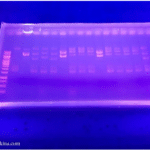Thymol is a monoterpene phenol component present in plants belonging to the family of Lamiaceae, especially in the Thymus species.
Thymol is an extract obtained from the plant Thymus vulgaris, commonly known as thyme. Around 300 different species belonging to the genus Thymus have been determined in other coastline countries such as North Africa, the Mediterranean sea, Southern Europe, and Asia. Thymus species are small herbs and subshrubs that are aromatic and have medical properties. This species was used during ancient times for pharmacological purposes. Thyme belonging to the Thymus genre, is an edible herb with an aroma and a different taste to the food. Apart from utilising thymol for medicinal purposes, they contain vitamins such as Vitamin A, and Vitamin C. Medicinal properties include anti-inflammatory, antimicrobial, and gastrointestinal effects. Thymol is administered via infusion or used in baths to treat skin and rheumatic diseases. Other oil constituents in thyme are used in cosmetic and food industries as antioxidants and preservatives. They are also used as agrochemicals to increase crop yields.
Overview of Thymol
Chemically called 2-isopropyl-5-methylphenol (C10H14O), Thymol is an oil extracted from the thyme (Thymus vulgaris vulgaris) plant. This oil constituent is obtained from the slightly fleshy leaves by condensation process to produce oil. Thyme contains about 0.5-2.5% oil, of which 45-47% is thymol, a significant constituent; other chemical components include p-cymene, carvacrol, linalool, γ-terpinene, and α-pinene. From these components, phenolic compounds such as thymol and carvacrol contain solid antiseptic properties and antioxidants as they are rich in flavonoids.
With ample benefits of using thymol have encouraged WHO (World Health Organisation) to include Thymus vulgaris as a therapeutic herb. This is achieved by converting thyme into essential oil by adding it to food for aroma, flavor, and preservation. Therefore, thymol is used in the food and cosmetic industries. Furthermore, the FDA has recognized this compound (Food and Drug Administration, US) for its antioxidant and antimicrobial activities. Additionally, thymol is an active ingredient in various pesticides and is used as a microbial repellent. Although thymol is a significant ingredient in Thymus vulgaris, they are also obtained from other plant species belonging to the Lamiaceae family. These plants include; Ocimum gratissimum L., Monarda L., Trachyspermum ammi, etc.
Medicinal purposes
Thymol present in thyme contains anti-inflammatory, antioxidant, and antimicrobial effects and is utilised to treat most skin conditions to gastrointestinal infections. Hence, this chemical compound can neutralise specific bacteria, viruses, and fungal infections. Thyme in its processed form can be applied to the skin, inhaled, and taken by mouth. The spectrum of practical applications of thyme ranges from medicinal to psychological to nutritional benefits. Thyme is used to treat simple symptoms such as cough, cold, diarrhea, and sore throat. They are also used to reduce menstrual cramps and urinary tract infections, prevent hair loss, treat ear infections, arthritis, acne, etc. Other psychological issues that can be aided by thyme are anxiety, and dementia.
Aromatherapy is practiced to reduce anxiety by thyme via oral administration. The application of thyme on the skin will help treat atopic dermatitis; this will reduce the inflammation of the epidermal skin. Additionally, thymol is used to treat secondary infections caused by Staphyloccocus aureus, which affects the skin surface. Therefore, thymol has antibacterial and other antimicrobial properties against many bacterial and microbial infections. This compound also provides cough relief and other remedies for respiratory conditions via inhalation. Through in-vitro experimentation, studies have shown that enteric bacteria that cause intestinal infections can be neutralised by thymol. Thyme also has pain-relieving properties and is antispasmodic (reduce spasms) to treat menstrual cramps.
Additional Benefits
Thyme adds flavor and aroma to food but is also utilised as a medicinal herb. This plant is rich in vitamins aside from thyme’s aromatic and rich flavor. Therefore, thyme is sold as vitamin supplements in capsule or liquid form. Additionally, thyme is used in various skincare products drinking teas. Thyme can stimulate appetites, enhance immunity, reduce inflammation, and act as agrochemicals against insects. Thyme is one of the primary ingredients used to repel insects and is included in insecticides and pesticides.
Although the applications of thyme are vast and advantageous, overconsumption of thyme orally might cause headaches, dizziness, and stomach aches. Furthermore, the consumption of thyme oil will amplify the side effects such as hypotension (low blood pressure). Some people are allergic to thyme oil, leading to vomiting and nausea, whereas the person will have dermatitis when applied to the skin. Thymol contains estrogen effect capable of influencing mensuration and posing a risk of miscarriage. Therefore, the consumption of thymol consisting of thyme oil or thyme supplements should be avoided during the gestational period; however, inhaling the aroma of thyme is harmless.
Hence, thymol can cause hypotension; therefore, it should be avoided for people taking medications for high blood pressure. Since thymol reduces blood clotting, the effects of anticoagulants are amplified, causing easy bleeding. Thus, the necessary consumption of thymol can provide health benefits, while overconsumption will lead to potential side effects. Additionally, it is essential to avoid consuming thyme supplements unnecessarily as they should not be taken with other medications.









